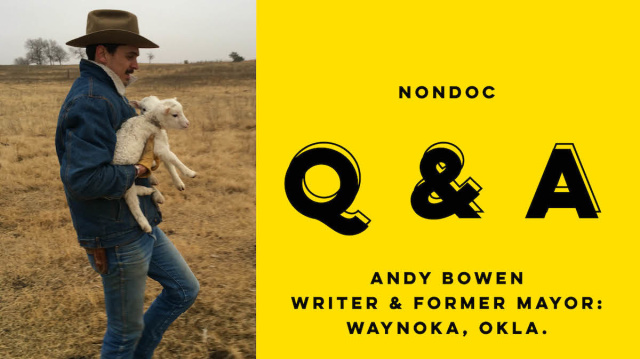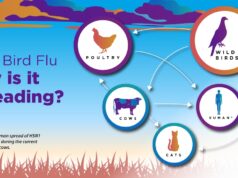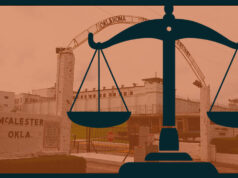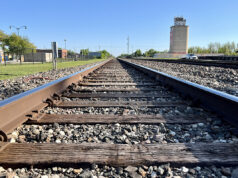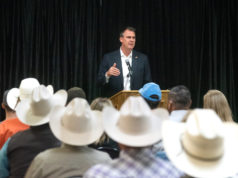
(Editor’s Note: While Andy Bowen contributes creative writing to NonDoc, we believe his experiences as the mayor of a rural town are interesting enough to warrant this Q&A.)
Is it possible for an affable country boy to soldier through the political gauntlet on a journey from small-town mayor to governor of Oklahoma?
Andy Bowen is willing to try. Here, the former mayor of Waynoka and retired free-range pig farmer recalls the circumstances that brought him into local politics, the things he learned while seated in city government, and his aspirations for the future.
Questions and responses were exchanged via email, and some text has been lightly edited for style and grammar.
How did it come to pass that you became mayor? Were you elected or appointed? How old were you?
I was 29 years old when I was elected on Feb. 12, 2013. I had been, at that point, president of the Waynoka Chamber of Commerce for two years, and our organization had been trying to address some policy issues with the City that we felt like were holding us back, from an economic-development standpoint.
Specifically, we had been trying to change zoning laws to designate the downtown area as a specific, retail district. There was an issue with people buying old, beautiful buildings downtown, using them for storage, putting no money in them for upkeep and allowing them to deteriorate. We felt that, while those properties certainly belonged to the owners of record, culturally they belonged to the community, and their preservation is the responsibility of the community. However, we couldn’t get much traction on this issue with City administration, as it was then constituted, so when the mayor resigned and a special election was called, I tried to recruit a few Chamber members to run. Everyone that I talked to said, “No,” and a few of them said that I should run.
At that point, I had only lived in Waynoka for about two-and-a-half years, and my opponents were both locals. Eventually, I agreed to file and run, and when election day came, I won overwhelmingly. If memory serves, I had 102 votes to 65 votes for one opponent and 35 for the other.
Tell the readers a little about the town of Waynoka.
Waynoka is an interesting place. I lived there for five years, seven months and two days, and I think I felt at home on day one. The main industries are agriculture (which is, of course, what brought me there), energy and tourism.
It’s that last one that makes it stand out from other towns in western Oklahoma. Nearly all small towns felt the effects of the recent oil boom to some degree, and nearly all of them are feeling the effects of the bust now. In Waynoka’s case, however, both effects are mitigated by its proximity to Little Sahara State Park. LSSP sees over 200,000 visitors a year, and many of them come to Waynoka to eat, to shop, to look around and especially to drink. Waynoka had a population of 926 people as of the 2010 census, but it had four bars. Now it boasts three and a-half. A Friday night in downtown Waynoka might not provide a soul with any more elbow room than a Friday night in downtown Oklahoma City.
The people are friendly, laid back and easy to get along with. I recommend anyone take a no-expectations, open-minded trip to about anywhere in northwest Oklahoma, but especially in Waynoka. And if you run across all the pieces of my heart that I left in that little town, leave them lie. They belong there.
Those who know you would likely consider you a rather progressive figure for a town as rural and small as Waynoka. Can you recall any specific instances where your personal ideologies conflicted with those of the local populace? Or did you consciously walk a line between staying true to your principles and compromising for the sake of getting things done?
Yes and yes and yes and yes.
I think it may be somewhat misleading to say that my personal beliefs are progressive for a rural community. My personal beliefs are fairly progressive for the corner of Haight and Ashbury, I think. And while fighting all of those battles can be personally gratifying and even a little fun, progress is never in the battle. Progress always comes with peace.
I learned a lot about how to maintain my grasp on a person’s humanity in the face of completely reprehensible ideas. I heard good people say horribly racist and homophobic and anti-poor things, and my challenge in those moments was to keep my focus on that person’s humanity and to treat them accordingly. I was never shy about what I believed and why. I was never afraid to engage those wrong ideas where I met them, but I was always careful to engage the idea and not it’s proponent. One former mayor and I had a standing rule at Scoob’s Tavern: If we’re gonna talk politics, we’re gonna buy each other’s beers. It made zero financial difference to either of us that he bought the Coors Light and I bought the Budweiser for a couple of hours, but every time one of us needed a beer, we were both reminded that we are friends first and idea-holders second.
What would you consider some of your biggest achievements during your tenure as mayor?
My biggest achievement was maintaining my naiveté as long as I did, but if you’re looking for a less ethereal answer, I’m sure it was the downtown-revitalization project. We were able to completely overhaul the entire infrastructure system of the downtown business district, and we were able to get the state and federal governments to pay for most of it. New sidewalks, new streets, new lighting, new water lines, new zoning, a grant program to enhance the curb appeal of buildings in the district. Millions of dollars spent and Waynoka is still in excellent financial shape, and as far as I know, still excited to do more.
What would you consider some of your biggest failures?
Leaving.
Now that the position of Waynoka mayor is behind you, what would you consider your biggest take-aways?
That we are too often kicking at the wind. We really don’t disagree all that much about what would make our lives better, and most people don’t begrudge their neighbor a leg up, whether from a church or the government. The challenge is to remind people that we are all neighbors. We have to find a way to connect the Ayn Rand-loving Republican to the single mom pulling in $8/hour at the local convenience store.
I once had a very frank conversation with the owner of a prominent chain of convenience stores in northwest Oklahoma about the poor pay and poor working conditions of his store in Waynoka. I pointed out to him that to treat his employees that way is a betrayal of his Christian faith. His response was to defend his faith to me by telling me about all of the mission trips to Africa that he funds and participates in. I could not make him see the need right in front of him.
The truth is that he didn’t want to see it. A mission trip to Africa is quite an expense, to be sure, but it’s an isolated expense and a little goes a long way over there. What I was asking him to do was to change the entire culture of his business into one that valued people over profit. That just did not compute for him. I couldn’t find a way to speak his language. Maybe that was my biggest failure, come to think of it ….
What, if any, political aspirations do you have for the future?
I want to be governor of this state. I’ve flunked out of college twice and never really held a job more than four or five years, and I’m still better qualified than the last two. I’m sorry to all the Brad Henry fans out there. I’m sure he’s a good and decent man, but doing nothing for eight years other than maintaining an affable personality and a winning smile do not make one a good statesman. Our standard should be higher than, “not a Republican.”








